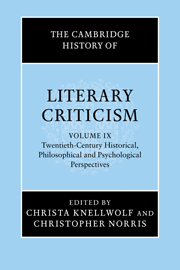Book contents
- Frontmatter
- Introduction
- HISTORY
- MARXISM AND POST-MARXISM
- FROM CULTURAL POETICS TO CULTURAL STUDIES
- PSYCHOANALYTIC APPROACHES
- GENDER AND SEXUALITY
- 15 The history of feminist criticism
- 16 Feminism and deconstruction
- 17 Gay, lesbian, bisexual, queer and transgender criticism
- COLONIALISM, POST-COLONIALITY, NATION AND RACE
- MODERNITY AND POSTMODERNISM
- PHILOSOPHY, AESTHETICS AND LITERARY CRITICISM
- INTERDISCIPLINARY APPROACHES
- Bibliography
- Index
- References
17 - Gay, lesbian, bisexual, queer and transgender criticism
from GENDER AND SEXUALITY
Published online by Cambridge University Press: 28 March 2008
- Frontmatter
- Introduction
- HISTORY
- MARXISM AND POST-MARXISM
- FROM CULTURAL POETICS TO CULTURAL STUDIES
- PSYCHOANALYTIC APPROACHES
- GENDER AND SEXUALITY
- 15 The history of feminist criticism
- 16 Feminism and deconstruction
- 17 Gay, lesbian, bisexual, queer and transgender criticism
- COLONIALISM, POST-COLONIALITY, NATION AND RACE
- MODERNITY AND POSTMODERNISM
- PHILOSOPHY, AESTHETICS AND LITERARY CRITICISM
- INTERDISCIPLINARY APPROACHES
- Bibliography
- Index
- References
Summary
The title of this chapter puts in roughly historical order related types of criticism that concentrate on varieties of what might be loosely termed sexual dissidence. All of these labels emerge from dynamic mid- and late twentieth-century struggles to emancipate anti-normative sexual desires and gender identities from legal, medical and moral oppression. The word gay, for example – if traceable to male homosexual parlance of the Victorian era – became a politically charged term around which the short-lived Gay Liberation Front (GLF) of the late 1960s and early 1970s could mobilise demonstrations, festivals and marches that celebrated same-sex desires. Repudiating the clinical and pathological connotations often attached to the category homosexual (in use from at least the 1890s onwards), the GLF upheld gay as an expression of pride in those desires between persons of the same sex that western cultures had for centuries outlawed and punished. In the annals of sexual history, GLF came into its own after the police attempted to raid the Stonewall Inn, a gay bar located in Greenwich Village at New York City, on 27 June 1969. Rather than succumb to police harassment, the Stonewall's customers fought back at the authorities for two nights. Soon referred to simply as Stonewall, this upsurge of militancy immediately provoked – in John D'Emilio's words – ‘intense discussion of what many had begun to memorialise as the first gay riot in history’.
Spreading rapidly across the United States, the GLF soon established itself in other western nations such as Australia, Canada and the United Kingdom. This movement derived its political energy from a broad repertoire of socialist and leftist thought that energised Civil Rights groups, such as the Black Panthers and the Women's Liberation Movement (WLM), in North America.
- Type
- Chapter
- Information
- The Cambridge History of Literary Criticism , pp. 217 - 234Publisher: Cambridge University PressPrint publication year: 2001



